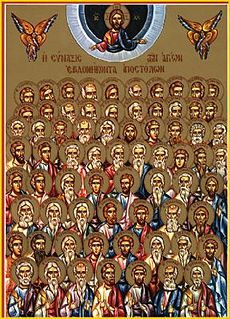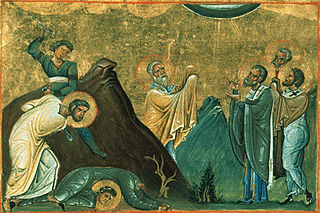
Stachys the Apostle was the second bishop of Byzantium, from AD 38 to AD 54. He seemed to be closely connected to Andrew and Paul. Eusebius quotes Origen as saying that Andrew had preached in Asia Minor and in Scythia, along the Black Sea as far as the Volga and Kiev, hence he became a patron saint of Romania and Russia. According to tradition, Saint Andrew founded the See of Byzantium in 38, installing Stachys as bishop. This See would later develop into the Patriarchate of Constantinople, having Apostle Andrew as its Patron Saint. It was not clear if Stachys was the same person whom Paul calls "dear" in the Epistle to the Romans, but anyway, he is always associated in traditions with five other apostles that are the very same names mentioned together with him by Paul in Romans 16:8-11.

April 21 - Eastern Orthodox liturgical calendar - April 23

The seventy[-two] disciples were early emissaries of Jesus mentioned in the Gospel of Luke. According to Luke, the only gospel in which they appear, Jesus appointed them and sent them out in pairs on a specific mission which is detailed in the text.

Quartus was an early Christian who is mentioned in the Bible.

January 3 - Eastern Orthodox liturgical calendar - January 5

Ampliatus, was a Roman Christian mentioned by Paul in one of his letters, where he says, "Greet Ampliatus, whom I love in the Lord." He is considered one of the Seventy Disciples by the Eastern Orthodox Church. Tradition has it that he and his companions subsequently attached themselves to the Apostle Saint Andrew, and ultimately died martyrs.

Erastus of Corinth, also known as Erastus of Paneas, held the political office of steward, in Corinth, according to the Epistle to the Romans 16:23 of the New Testament. The office is defined as "the manager of household or of household affairs" or, in this context, "treasurer". The King James Version uses the translation "chamberlain", while the New International Version uses "director of public works". A person named Erastus mentioned in 2 Timothy 4:20 and Acts 19:22 is often taken to be the same person. However, whereas the Erastus mentioned in the second letter to Timothy may be the same person, it is unlikely that the Erastus referred to in the Book of Acts is the same Erastus. This Erastus was a travelling companion of the apostle Paul and accompanied him on his third missionary journey. It was on this third expedition that Paul penned the letter to the Roman believers in which he sent greetings from Erastus, the city treasurer. He could not have been the person in Paul's entourage. The apostle Paul wrote his letter to the church in Rome while he was in Corinth [please check reference, this passage doesn't exist].
Narcissus of Athens is numbered among the Seventy Disciples. Along with the Apostles Urban of Macedonia, Stachys, Ampliatus, Apelles of Heraklion and Aristobulus of Britannia he assisted Saint Andrew. The Apostle Philip ordained St. Narcissus bishop of Athens. His feast day is October 31.
Apelles of Heraklion is numbered among the Seventy Disciples. Along with the Apostles Urban of Macedonia, Stachys, Ampliatus, Narcissus of Athens and Aristobulus of Britannia he assisted Saint Andrew. St. Apelles was bishop of Heraclea in Trachis. His feast day is October 31.

Aristobulus of Britannia is a Christian saint named by Hippolytus of Rome (170-235) and Dorotheus of Gaza (505-565) as one of the Seventy Disciples mentioned in Luke 10:1–24 and as the first bishop in Roman Britain.

Herodion of Patras was a relative of Saint Paul whom Paul greets in Romans 16:11. According to tradition, he was numbered among the Seventy Disciples and became bishop of Patras, where he suffered greatly. After beating, stoning, and stabbing him, they left him for dead, but St. Herodion arose and continued to serve the Apostles.

Asyncritus of Hyrcania, also Asynkritos, was numbered among the Seventy Disciples. He was bishop of Hyrcania in Asia. Saint Paul mentions him in his letter to the Romans. The Church remembers St. Asyncritus on April 8.
Phlegon of Marathon is numbered among the Seventy Disciples. He was bishop of Marathon in Thrace. He is referenced in Romans 16:14, and his feast day is on April 8.

Philologus of Sinope is numbered among the Seventy Disciples, and is commemorated with them on January 4. He is also commemorated on November 5 together with Ss. Patrobas, Hermas, Linus, and Gaius.

Sosipater is a person mentioned in the New Testament, in Romans 16:21. He is probably the same person as Sopater mentioned in Acts 20:4.

According to the New Testament book of Romans, Tertius of Iconium acted as an amanuensis for Paul the Apostle, writing down his Epistle to the Romans. He is numbered among the Seventy Disciples in a list pseudonymously attributed to Hippolytus of Rome, which is found in the margin of several ancient manuscripts.
Carpus of Beroea of the Seventy Disciples is commemorated by the Church on May 26 with Alphaeus, and on January 4 with the Seventy.

October 30 - Eastern Orthodox liturgical calendar - November 1

March 15 - Eastern Orthodox liturgical calendar - March 17

March 14 - Eastern Orthodox liturgical calendar - March 16








